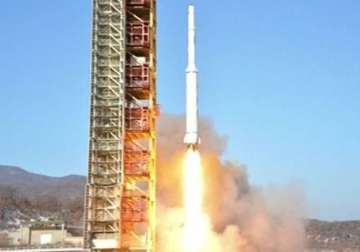North Korea restarts plutonium reactor: US intelligence officer
Washington: North Korea has expanded a uranium enrichment facility and restarted a plutonium reactor that could start recovering material for nuclear weapons in weeks or months, the U.S. intelligence chief said Tuesday in delivering the

Washington: North Korea has expanded a uranium enrichment facility and restarted a plutonium reactor that could start recovering material for nuclear weapons in weeks or months, the U.S. intelligence chief said Tuesday in delivering the annual assessment by intelligence agencies of the top dangers facing the country.
He also said Islamic militants and those inspired by the Islamic State group will continue to pose a threat to Americans at home and abroad; al-Qaida remains an enemy; and the U.S. will continue to see cyber threats from China, Russia and North Korea.
Director of National Intelligence James Clapper said that Pyongyang announced in 2013 its intention to refurbish and restart nuclear facilities, to include the uranium enrichment facility at Yongbyon and its plutonium production reactor, which was shut down in 2007.
Clapper said U.S. intelligence had assessed that North Korea has expanded Yongbyon and restarted the plutonium production reactor there.
Clapper also told the Senate Armed Services Committee in his opening statement that North Korea has been operating the reactor long enough that it could begin to recover plutonium "within a matter of weeks to months."
Both findings will deepen concern that North Korea is not only making technical advances in its nuclear weapons program, following its recent underground test explosion and rocket launch, but is working to expand what is thought to be a small nuclear arsenal. U.S.-based experts have estimated that North Korea may have about 10 bombs, but that could grow to between 20 and 100 by 2020.
North Korea on Sunday launched a rocket carrying an Earth observation satellite into space. The launch followed a Jan. 6 underground nuclear explosion that North Korea claimed was the successful test of a "miniaturized" hydrogen bomb. Many outside experts were skeptical and Clapper said the low yield of the test "is not consistent with a successful test of a thermonuclear device."
Read Also: North Korea's new satellite flew over Super Bowl site
Clapper said that Pyongyang is also committed to developing a long-range, nuclear-armed missile that is capable of posing a direct threat to the United States, "although the system has not been flight-tested."
Islamic militants, Clapper said, will continue plotting against U.S. interests overseas and homegrown attacks will pose the most significant threat from violent extremists to Americans at home.
"The perceived success of attacks by homegrown violent extremists in Europe and North America, such as those in Chattanooga and San Bernardino, might motivate others to replicate opportunistic attacks with little or no warning, diminishing our ability to detect terrorist operational planning and readiness," he said.
"ISIL involvement in homeland attack activity will probably continue to involve those who draw inspiration from the group's highly sophisticated media without direct guidance from ISIL leadership," he said using an acronym for the militant group.
Clapper said U.S. information systems, controlled by the U.S. government and American industry, are vulnerable to cyberattacks from Russia and China. North Korea "probably remains capable and willing to launch disruptive or destructive cyberattacks to support its political objectives," he said.
Moscow "is assuming a more assertive cyber posture" that is based on its willingness to target critical infrastructure and carry out espionage operations even when those operations have been detected and under increased public scrutiny, Clapper said. Russia's cyber operations are likely to target U.S. interests in part to underpin its intelligence gathering to support Russia's moves in the Ukraine and Syrian crises, he said.
Clapper also said Moscow's incursion in Ukraine and other "aggressive" moves around the globe are being done in part to demonstrate that it is a superpower equal to the United States. He said he's unsure of Russia's end game but is concerned "we could be into another Cold War like-spiral."
"I think the Russians fundamentally are paranoid about NATO," Clapper said. "They're greatly concerned about being contained and are of course very, very concerned about missile defense, which would serve to neuter what is the essence to their claim to great power status, which is their nuclear arsenal."